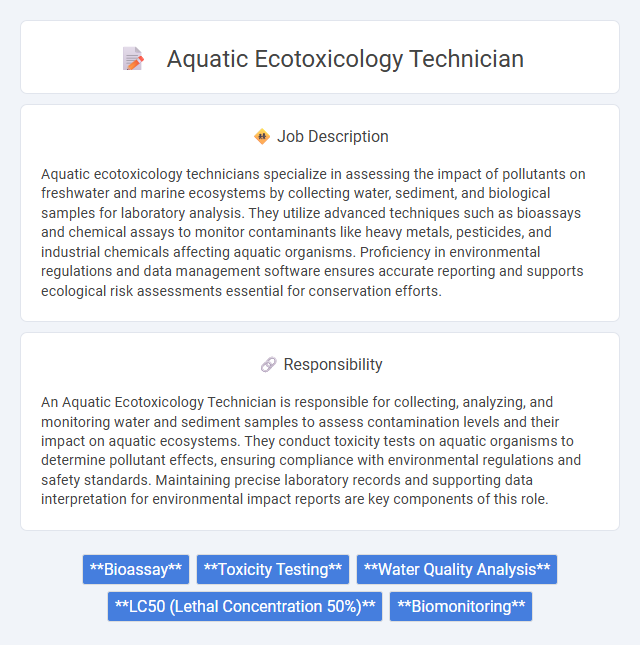
Aquatic ecotoxicology technicians specialize in assessing the impact of pollutants on freshwater and marine ecosystems by collecting water, sediment, and biological samples for laboratory analysis. They utilize advanced techniques such as bioassays and chemical assays to monitor contaminants like heavy metals, pesticides, and industrial chemicals affecting aquatic organisms. Proficiency in environmental regulations and data management software ensures accurate reporting and supports ecological risk assessments essential for conservation efforts.
People with a strong interest in environmental science and proficiency in handling aquatic organisms may find the role of an aquatic ecotoxicology technician suitable. Those who are comfortable working in outdoor and laboratory settings, often involving water sampling and chemical testing, are likely to adapt well. Individuals who prefer consistent routines and have good attention to detail stand a higher probability of thriving in this position.
Qualification
Aquatic ecotoxicology technicians require a strong background in environmental science, biology, or chemistry, typically holding an associate or bachelor's degree in a related field. Proficiency in water sampling, chemical analysis, and bioassay techniques is essential to assess the impact of pollutants on aquatic ecosystems. Knowledge of laboratory safety protocols, data collection, and regulatory compliance ensures accurate environmental monitoring and reporting.
Responsibility
An Aquatic Ecotoxicology Technician is responsible for collecting, analyzing, and monitoring water and sediment samples to assess contamination levels and their impact on aquatic ecosystems. They conduct toxicity tests on aquatic organisms to determine pollutant effects, ensuring compliance with environmental regulations and safety standards. Maintaining precise laboratory records and supporting data interpretation for environmental impact reports are key components of this role.
Benefit
An aquatic ecotoxicology technician likely experiences benefits such as gaining specialized skills in water quality analysis and pollutant impact assessment, which can enhance career prospects in environmental science fields. They probably have opportunities for hands-on research and contributing to ecosystem preservation, potentially increasing job satisfaction and professional growth. Access to collaborative projects with environmental agencies might offer networking advantages and further expertise development.
Challenge
The role of an aquatic ecotoxicology technician likely involves navigating complex environmental challenges, such as assessing the impact of pollutants on aquatic ecosystems. They probably face difficulties in accurately measuring toxic substances and interpreting their effects on diverse aquatic organisms. This position demands strong problem-solving skills to adapt to unpredictable environmental variables and ensure reliable data collection.
Career Advancement
Aquatic ecotoxicology technicians gain expertise in assessing the impact of pollutants on aquatic ecosystems, using advanced laboratory techniques and environmental monitoring tools. Career advancement often leads to roles such as environmental scientist, ecotoxicologist, or regulatory affairs specialist, requiring specialized knowledge in toxicology, chemistry, and environmental laws. Continuous professional development and certifications in environmental risk assessment enhance opportunities for leadership positions in research institutions, government agencies, or private environmental consulting firms.
Key Terms
Bioassay
Aquatic ecotoxicology technicians specialize in conducting bioassays to assess the impact of contaminants on aquatic organisms. They perform toxicity tests using bioindicators such as algae, daphnia, and fish larvae to measure pollutant effects on survival, growth, and reproduction. Proficiency in data analysis, sample collection, and maintaining controlled laboratory conditions is essential for accurate bioassay results.
Toxicity Testing
Aquatic ecotoxicology technicians specialize in conducting toxicity testing to assess the impact of pollutants on aquatic organisms and ecosystems. They perform bioassays using standard test species such as Daphnia magna, Ceriodaphnia dubia, and Pimephales promelas to measure lethal and sublethal effects of contaminants. Their work supports environmental risk assessments by providing accurate data on chemical toxicity under controlled laboratory and field conditions.
Water Quality Analysis
Aquatic ecotoxicology technicians specialize in water quality analysis by collecting and examining water samples to detect contaminants such as heavy metals, pesticides, and organic pollutants. They utilize advanced analytical instruments like gas chromatographs and spectrophotometers to measure chemical concentrations and assess toxic effects on aquatic ecosystems. Precise water quality data generated by these technicians supports environmental impact assessments and helps enforce regulatory standards for aquatic habitat protection.
LC50 (Lethal Concentration 50%)
Aquatic ecotoxicology technicians conduct experiments to determine LC50 values, which measure the concentration of a substance causing 50% mortality in aquatic organisms within a specific exposure period. These professionals meticulously prepare test solutions, monitor organism health, and record survival rates to assess pollutant toxicity in freshwater and marine environments. Accurate LC50 data supports environmental risk assessments and regulatory compliance in aquatic ecosystems.
Biomonitoring
Aquatic ecotoxicology technicians specializing in biomonitoring collect and analyze water, sediment, and biological samples to assess the impact of pollutants on aquatic ecosystems. They utilize bioindicator species and molecular biomarkers to detect sub-lethal toxic effects and monitor ecosystem health over time. Expertise in field sampling techniques, laboratory analysis, and data interpretation is crucial for ensuring environmental compliance and guiding remediation efforts.
 kuljobs.com
kuljobs.com